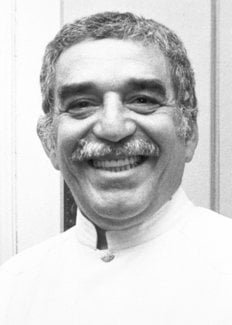Gabriel García Márquez
Biographical

Gabriel García Márquez was born in 1927 in the small town of Aracataca, situated in a tropical region of northern Colombia, between the mountains and the Caribbean Sea. He grew up with his maternal grandparent – his grandfather was a pensioned colonel from the civil war at the beginning of the century. He went to a Jesuit college and began to read law, but his studies were soon broken off for his work as a journalist. In 1954 he was sent to Rome* on an assignment for his newspaper, and since then he has mostly lived abroad – in Paris, New York, Barcelona and Mexico – in a more or less compulsory exile. Besides his large output of fiction he has written screenplays and has continued to work as a journalist.
| Bibliography |
| La hojarasca. Bogotá: Ed. S. L. B., 1955. |
| El coronel no tiene quien le escriba. Medellín: Aguirre Ed., 1961. |
| La mala hora. Madrid: Talleres de Gráficas “Luis Pérez”, 1962 (ed. desautorizada por el autor); 2. ed.: Mexico: Ed. Era, 1966. |
| Los funerales de la Mamá Grande. Xalapa, 1962. |
| Cien años de soledad. Buenos Aires: Ed. Sudamericana, 1967. |
| Monólogo de Isabel viendo llover en Macondo. 1969. |
| Relato de un náufrago. Barcelona: Tusquets Ed., 1970. |
| La increíble y triste historia de la cándida Eréndira y de su abuela desalmada. Barcelona: Barral Ed., 1972. |
| Chile, el golpe y los gringos. 1974. |
| Ojos de perro azul. Barcelona: Plaza y Janés, 1974. |
| Cuando era feliz e indocumentado. Barcelona: Plaza y Janés, 1975. |
| El otoño del patriarca. Barcelona: Plaza y Janés, 1975. |
| Todos los cuentos. Barcelona: Ed. Bruguera, 1975. |
| Obra periodística. Vol. 1: Textos costeños. Barcelona: Ed. Bruguera, 1981. |
| Crónica de una muerte anunciada. Barcelona: Ed. Bruguera, 1981. |
| El rastro de tu sangre en la nieve: el verano feliz de la señora Forbes. Bogotá: W. Dampier Editores, 1982. |
| Viva Sandino. Managua: Nueva Nicaragua, 1982. |
| El secuestro (screenplay). Salamanca: Lóquez, 1982. |
| El asalto: el operativo con el FSLN se lanzó al mundo, Nueva Nicaragua, 1983. |
| Eréndira (screenplay from his own novella), N.P., Les Films du Triangle, 1983. |
| El amor en los tiempos del cólera. Bogotá: Oveja Negra, 1985. |
| El general en su laberinto. Bogotá: Oveja Negra, 1989. |
| Doce cuentos peregrinos. Bogotá: Oveja Negra, 1992. |
| In English |
| Leaf Storm, and Other Stories. (La hojarasca. 1955) Transl. by G. Rabassa. London: Cape, 1972; New York: Harper & Row, 1972, 1979; Pan Books, 1979. |
| No One Writes to the Colonel. (El coronel no tiene quien le escriba. 1961.) Transl. by. S. Bernstein. London: Cape, 1971; New York: Harper & Row, 1979. |
| An Evil Hour. (La mala hora. 1962.) Transl. by G. Rabassa. New York: Harper & Row, 1979. |
| Big Mama’s Funeral. (Los funerales de la Mamá Grande.1962.) (Published with: No One Writes to the Colonel. See above.) |
| One Hundred Years of Solitude. (Cien años de soledad. 1967.) Transl. by G. Rabassa. New York: Harper & Row, 1970; Pan Books, 1980. |
| Innocent Eréndira, and Other Stories. (La increible y triste historia de la cándida Eréndira… 1972). Transl. by G. Rabassa. New York: Harper & Row, 1978, 1979; Pan Books, 1981. |
| The Autumn of the Patriarch. (El otoño del patriarca, 1975.) Transl. by G. Rabassa. New York: Harper & Row, 1976; Pan Books, 1978. |
| Chronicle of a Death Foretold. (Crónica de una muerte anunciada, 1981.) Transl. by G. Rabassa. London: Cape, 1982. |
| Collected Stories. New York: Harper, 1984; revised edition, London: Cape, 1991. |
| Love in the Time of Cholera (El amor en los tiempos del cólera). Transl. by E. Grossman. New York: Knopf and London: Cape, 1988. |
| Diatribe of Love Against a Seated Man (play produced in Buenos Aires, 1988). |
| Collected Novellas. New York: Harper Collins, 1990. |
| The General in his Labyrinth (El general en su laberinto). Transl. by E. Grossman. New York: Knopf, 1990 and London: Cape, 1991. |
This autobiography/biography was written at the time of the award and first published in the book series Les Prix Nobel. It was later edited and republished in Nobel Lectures. To cite this document, always state the source as shown above.
* In his autobiographical book Vivir para contarla (2002) Gabriel García Márquez mentions Genève as the first town he was sent to.
Gabriel García Márquez died on 17 April 2014.
Nobel Prizes and laureates
Six prizes were awarded for achievements that have conferred the greatest benefit to humankind. The 14 laureates' work and discoveries range from quantum tunnelling to promoting democratic rights.
See them all presented here.
